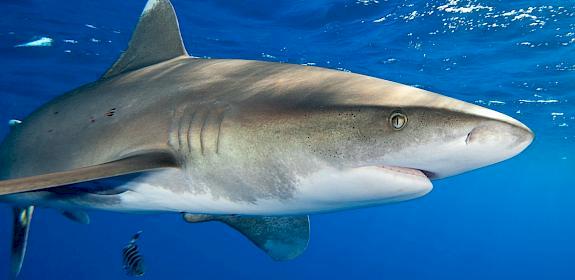The Latin America Chapter: Turning the page on illegal trade in the transport sector
Latin America abounds in biodiversity; a place to witness birds as they flock to the sky in technicolour and become immersed in the indefinable density of the world’s largest rainforest – the Amazon. However, such scenes are increasingly at risk, with Latin America’s wild species population sizes plummeting by 94% between 1970 and 2020. Unfortunately, the colours and features of the region's wild species that make them unique also enhance their value to traffickers.
To combat illicit trade in the region, United for Wildlife (UfW) is hosting the launch of its Latin America Chapter from 25 to 27 July. The event will bring together key stakeholders from the transport and finance sectors, NGOs, law enforcement, and the government to coordinate efforts against the trafficking of wild species.
Founded by Prince William and The Royal Foundation in 2014, UfW protects endangered species from illicit trade through its two Taskforces; the Transport Taskforce and the Financial Taskforce.
Colomban MacDowall, TRAFFIC’s Senior Manager for Global Projects, will brief the event attendees on countermeasures to trafficking in the transport sector. The knowledge presented by TRAFFIC will be vital in the establishment of UfW’s Latin American Transport Taskforce.
Transportation is an obvious component to any form of trade, and the trade of wild species is no exception. Whether by sea, by air, or through commercial, private, or public companies, wildlife traffickers use numerous tactics to exploit the transport and logistics industry to smuggle wild species from source to market across the globe.
Despite bans on commercial bird trade in Latin America, birds remain the most commonly trafficked animal category by aviation, highlighting the necessity for transportation companies to stay alert to risks in the supply chain.

A recent partnership between TRAFFIC and USAID “Reducing Opportunities for Unlawful Transport of Endangered Species (ROUTES)”, brought together aviation and maritime stakeholders, together with NGO and government partners, to strengthen responses against the trafficking of wild species in the transport sector.
The ROUTES project has achieved industry-wide progress by creating awareness and training resources for airport, aviation, and transport staff and an online database of aviation wildlife seizures to support the development of anti-trafficking policies.
In collaboration with Crime Stoppers International, TRAFFIC has also developed Wildlife Sentinel, a mobile reporting app allowing airport staff to report suspicions of trafficking to law enforcement anonymously.
The illegal trade of wild species in the maritime industry continues to be addressed by strengthening measures to ensure responsible supply chains. Forming alliances to create industry-wide regulations and international guidelines, such as the International Maritime Organisation Guidelines, is an ongoing and vital component of combatting the issue. Using previous successes as a guide, TRAFFIC is delighted to support UfW in strengthening the transport industry against illegal trade.
UfW’s event will take place only days before the Amazon Cooperation Treaty Organisation (ACTO) summit on 8 August. Hosted in Brazil, the summit will be a chance for Latin American nations to renew their agreement and discuss how to attract investments, combat deforestation, protect Indigenous peoples, and encourage sustainable development in the face of climate change.
As 40% of the world’s species are found in Latin America, the launch of UfW’s Latin America Chapter is vital to preserving biodiversity and Amazonian ecosystems for future generations. TRAFFIC will continue to contribute its expertise and knowledge in the drive towards sustainability in Latin America and beyond.
The strategic importance of the Latin America and the Caribbean region to United for Wildlife cannot be understated. As home to over 50% of global biodiversity, the region is a significant target for the illegal wildlife trade. Partners like TRAFFIC will be critical in the establishment of the new Chapter to help drive action across the region and support local priorities.
Rob Campbell, United for Wildlife Programme Manager
About United for Wildlife

United for Wildlife is an unprecedented alliance between seven of the world’s most influential conservation organisations and The Royal Foundation of the Duke and Duchess of Cambridge and Prince Harry. The collaboration between Conservation International (CI), Fauna & Flora International (FFI), International Union for Conservation of Nature (IUCN), The Nature Conservancy (TNC), Wildlife Conservation Society (WCS), WWF-UK, the Zoological Society of London (ZSL) and The Royal Foundation hopes to lead the way to substantially increase the global response to major conservation crisis. http://www.unitedforwildlife.org/
About USAID

The United States Agency for International Development (USAID) is responsible for the majority of overseas development assistance from the United States Government and works to end extreme poverty and promote resilient, democratic societies while advancing security and prosperity for America and the world. www.usaid.gov/
About Crime Stoppers International

Crime Stoppers International (CSI) is a non-profit organisation with a global network of more than 800 accredited national and local Crime Stoppers chapters operating in 30-plus countries across six continents. Our work involves helping to disrupt serious and organised crime networks; educating and encouraging communities to share the information they have; developing and executing global anti-crime campaigns and delivering capacity building and advocacy initiatives.





